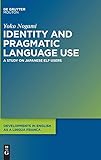Identity and Pragmatic Language Use : A Study on Japanese ELF Users / Yoko Nogami.
Material type: TextSeries: Developments in English as a Lingua Franca [DELF] ; 11Publisher: Berlin ; Boston : De Gruyter Mouton, [2020]Copyright date: ©2020Description: 1 online resource (XV, 281 p.)Content type:
TextSeries: Developments in English as a Lingua Franca [DELF] ; 11Publisher: Berlin ; Boston : De Gruyter Mouton, [2020]Copyright date: ©2020Description: 1 online resource (XV, 281 p.)Content type: - 9781501512131
- 9781501504174
- 9781501504211
- online - DeGruyter
- Issued also in print.
| Item type | Current library | Call number | URL | Status | Notes | Barcode | |
|---|---|---|---|---|---|---|---|
 eBook
eBook
|
Biblioteca "Angelicum" Pont. Univ. S.Tommaso d'Aquino Nuvola online | online - DeGruyter (Browse shelf(Opens below)) | Online access | Not for loan (Accesso limitato) | Accesso per gli utenti autorizzati / Access for authorized users | (dgr)9781501504211 |
Frontmatter -- Acknowledgements -- Contents -- Notes -- Chapter 1. Introduction -- Chapter 2. Language, identity and second language users through an ELF lens -- Chapter 3. Exploring ELF users’ identities and pragmatic language use -- Chapter 4. Narratives on a sense of English-speaking self -- Chapter 5. Power relations and negotiation of identities in ELF communication -- Chapter 6. Construction of cultural identities through ELF -- Chapter 7. Identity and pragmatic language use through ELF -- Chapter 8. Conclusion -- Appendices -- References -- Index
restricted access online access with authorization star
http://purl.org/coar/access_right/c_16ec
ELF (English as a lingua franca) research counters the monocentric view of English based on norms of native speakers of English, and supports any usages reflecting sociopragmatic and pragmalinguistic reality of ELF communication. Such an approach empowers any speakers of English to contemplate their own varieties of English as legitimate, providing them greater options for positive self-identification. Based on qualitative and interpretive methodology, this book illustrates how Japanese L2 English users establish identities related to L2 English as part of their multiple identities, and how they explore new identity options through ELF. Moreover, the author demonstrates how power relations relating to English language are constructed through the participants’ experiences in ELF interactions. Also, analysis of the data reveals that to what degree the Japanese L2 English users wish to affiliate with particular groups in ELF interactions with people from diverse cultural background.Because of the multidisciplinary nature of the study, this book will appeal to a broad audience such as scholars and students who are interested in further understanding of identity and sociocultural issues involved in intercultural communication.
Issued also in print.
Mode of access: Internet via World Wide Web.
In English.
Description based on online resource; title from PDF title page (publisher's Web site, viewed 25. Jun 2024)


